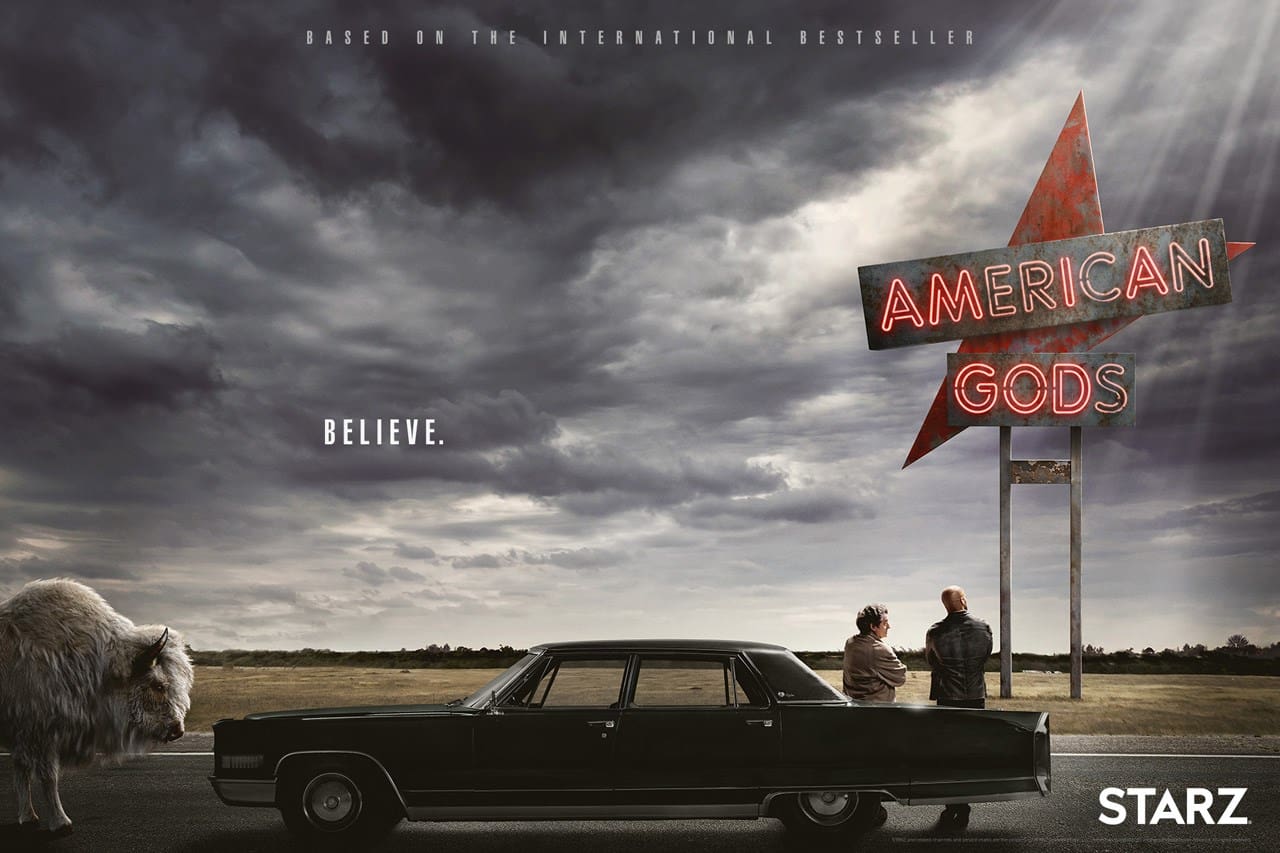A Murder of Gods Plot Summary:
Shadow (Ricky Whittle) accompanies Mr. Wednesday (Ian McShane) as he attempts to recruit the Roman god Vulcan (Corbin Bernsen) to his cause. Laura (Emily Browning) goes with Mad Sweeney (Pablo Schreiber) and Salim (Omid Abtahi) on the promise of a cure for her condition.
This week’s episode opens with what is easily the most provocative scene in the series so far. Given the current political climate, the controversial nature of the show’s decision to depict Jesus as a Hispanic immigrant making his way across the border is obvious. The further contrast with a violent Minutemen-type group that drapes itself in explicitly Christian imagery makes the statement even bolder. Only Anansi’s (Orlando Jones) speech about the injustice of slavery and its legacy in modern America comes close to rivaling this scene in terms of its powerful indictment of America’s failings. Unfortunately, the rest of the episode attempts to follow up on this theme with far less success than the excellent opening.
Shadow and Mr. Wednesday spend most of their time in a small town in Virginia that is dominated by a munitions factory run by the god Vulcan. The show posits that Vulcan has managed to thrive by replacing direct worship of himself with the worship of firearms. There’s something here to be said about American obsession with firearms, and furthermore how it manifests in fear of outsiders as the gun-wielding residents of Vulcan’s town all eye Shadow with suspicion. But these ideas are never more than gestured at, and even that only briefly, so they don’t really coalesce into anything. What’s more, it’s never made entirely clear what, exactly, Vulcan is thriving on. At first it seems to be the occasional industrial accident serving as makeshift volcano sacrifice, but then later he seems to suggest that gun violence is what powers him. This lack of both clarity and commitment to its ideas weakens the message considerably, and it ends up rather underwhelming.
In terms of the plot, this particular storyline is also considerably mixed. Its narrative function, to show a potential ally of Mr. Wednesday’s who has decided to side with the enemy, is obvious, and in this it is successful. Vulcan’s description of them as “the tide” is a good moment that helps reinforce the scale of what Shadow and Wednesday are up against. Yet how we get there is shaky, at best. Up until that point, Vulcan has been welcoming if obviously rude, even antagonistic. But then, as he forges Mr. Wednesday a sword, he suddenly admits to having betrayed them. It’s not clear how Wednesday knows this, or why Vulcan tells them, or why he went ahead and forged the sword and gave it to him if he intended to betray them. With a strong enough idea behind it, this sort of narrative sleight of hand could be forgiven, but given all the weaknesses in this storyline the shortcuts taken are too obvious to ignore.
Elsewhere in the episode, Laura continues last episode’s team-up with Mad Sweeney, along with new addition Salim as his memorable vignette now intersects with the main plot. The pairing of the acerbic Mad Sweeney with Laura is an entertaining one, and Salim allows for some more serious reflection on Laura’s part as to what it means to have now fully abandoned her life. Unlike Shadow and Mr. Wednesday, Laura’s attempts to come to grips with that as well as the possibility that Shadow may not want her back makes for compelling content. But the narrative involved has a distinct feeling of wheel-spinning. The three set out for some new location at Mad Sweeney’s direction, promising Laura a resurrection and Salim the location of his djinn, but they then spend the whole episode going to Indiana and back so Laura can momentarily consider, and ultimately reject, her old life. It’s more forgivable considering the more fully-formed ideas behind it, but it’s still unmistakably a way to shuffle pieces around the board without actually changing anything yet, and that detracts from things.
Overall, despite the strong opening we end up with what is easily the weakest episode of American Gods so far. Of course, all the usual strengths are still there, not least of which is Bryan Fuller’s incredible eye for breath-taking visuals, but that’s not enough to overcome the narrative problems. That this episode also happens to diverge heavily from the source novel is a cause for some concern about the future of the series, but it’s entirely premature to make any grand pronouncements based on one weak episode. For now, let’s simply hope that it was just a bump in the road for what has otherwise been an excellent new series.
Rating: 5 out of 10


